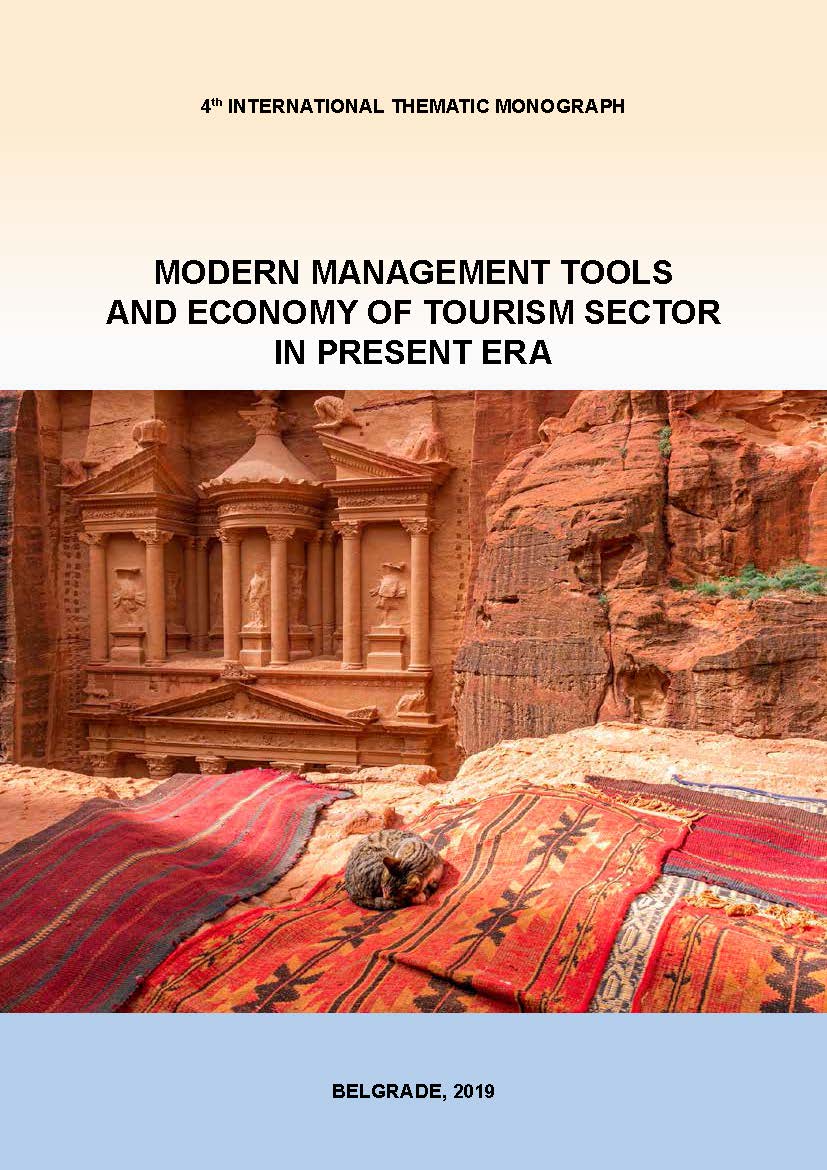|
CHALLENGES OF BUSINESS MODEL DIGITALIZATION IN CASE OF TRAVEL AGENCIES Sanja Marinković University of Belgrade, Faculty of Organizational Sciences, Jove Ilica 154, Belgrade, Serbia DOI: https://doi.org/10.31410/tmt.2019.307 4th International Thematic Monograph - Modern Management Tools and Economy of Tourism Sector in Present Era, Belgrade, 2019, Published by: Association of Economists and Managers of the Balkans in cooperation with the Faculty of Tourism and Hospitality, Ohrid, North Macedonia; ISSN 2683-5673, ISBN 978-86-80194-29-5; Editors: Vuk Bevanda, associate professor, Faculty of Social Sciences, Belgrade, Serbia; Snežana Štetić, full time professor, The College of Tourism, Belgrade, Serbia, Printed by: SKRIPTA International, Belgrade
|
|
Abstract: This paper presents a new collaborative business model developed for the needs of tourist sector in Serbia. Development of a new digital platform for travel agencies was a joint project involving IT experts and software engineers, and travel and tourism experts from several agencies in Serbia. The aim of the paper was to identify the results and benefits that the new business model could bring, as well as the challenges in implementation. Case study approach was used in order to collect relevant information from practice, to identify potential benefits and challenges for creators and first users of digital platform. In second phase of the research, the goal was to get feedback from travel agencies staff that was using a new digital platform. Through defined questionnaire they were asked to express their attitude about relevant determinants. In the conclusion, the findings from two research phases were compared and analyzed together and significant conclusions were drawn. Keywords: Digitalization, Services, Cofer, PlusPlusNT. REFERENCES Abrate, G., Bruno, C., Erbetta, F., & Fraquelli, G. (2019). Which Future for Traditional Travel Agencies? A Dynamic Capabilities Approach. Journal of Travel Research. Amit, R., & Zott, C. (2012). Creating value through business model innovation. 2012. Barnett M., & Standing C. (2001). Repositioning travel agencies on the Internet, Journal of Vacation Marketing, 7(2), 143-152. Bigné E., Decrop A. (2019). Paradoxes of Postmodern Tourists and Innovation in Tourism Marketing. In: Fayos-Solà E., Cooper C. (eds) The Future of Tourism. Springer, Cham Bock, R., Iansiti, M., & Lakhani, K. R. (2017). What the companies on the right side of the digital business divide have in common?, Harvard Business Review. Bughin, J., Catlin, T., Hirt, M, Willmott, P. (2018). Why digital strategies fail?, McKinsey Quarterly. Dredge, D., Phi, G., Mahadevan, R., Meehan, E. & Popescu, E.S. (2018) Digitalisation in Tourism: In-depth analysis of challenges and opportunities. Low Value procedure GRO-SME- 17-C-091-A for Executive Agency for Small and Medium-sized Enterprises (EASME), Virtual Tourism Observatory. Aalborg University, Copenhagen. Ecommerce News Europe. (2014). Ecommerce Serbia grows 39% to €70.4 mln - Ecommerce News. Ecommerce News. Retrieved 10 May 2016, from http://ecommercenews.eu Goertz, V. (2014). Travel agencies in the age of e-tourism. A comparative study of the current developments in Germany and France. Via. Tourism Review, (6). Hajime E. (2015). New business opportunities in the growing e – tourism industry. Hershey PA: IGI Global. Law R., Leung K., Wong J., (2004), The impact of the Internet on travel agencies, International Journal of Contemporary Hospitality Management, 16 (2), 100-107. Law, R., Leung, R., Lo, A., Leung, D., & Fong, L. H. N. (2015). Distribution channel in hospitality and tourism: Revisiting disintermediation from the perspectives of hotels and travel agencies. International Journal of Contemporary Hospitality Management, 27(3), 431-452. Marinković, S. (2012). Menadžment inovacija u uslugama. Zadužbina Andrejević, Beograd. Marzo-Navarro, M., Berne-Manero, C., Gómez-Campillo, M., & Pedraja-Iglesias, M. (2019). Strengths of Online Travel Agencies From the Perspective of the Digital Tourist. In Predicting Trends and Building Strategies for Consumer Engagement in Retail Environments (pp. 187-210). IGI Global. Ogonowska, M., & Torre, D. (2014). Patel, N. (2015) Ecommerce Techniques for Connecting with Millennial Shoppers. Kissmetrics. Retrieved from https://blog.kissmetrics.com/connecting-with-millennial-shoppers. Petković, G., Pindžo, R., & Agić-Molnar, M. (2018). Digital economy and (non) incremental changes in tourism and retail business model. Ekonomika preduzeća, 66(1-2), 151-165. Pitić G., Savić N., & Verbić, S. (2018). Digital Transformation and Serbia, Ekonomika preduzeća, 66(1-2), 107-119 Podovac, M., & Petrović, V. S. (2019, June). Role and importance of promotion through social networks on the example of tourist organizations. In TISC-Tourism International Scientific Conference Vrnjačka Banja (Vol. 4, No. 1, pp. 536-552). Roger-Monzó, V., Martí-Sánchez, M., & Guijarro-García, M. (2015). Using online consumer loyalty to gain competitive advantage in travel agencies. Journal of Business Research, 68(7), 1638-1640. Slivar, I., Božić, S., & Batković, A. (2016). Innovation in tourism: Perception of tourism providers from Croatia and Serbia. Review of Innovation and Competitiveness: A Journal of Economic and Social Research, 2(4), 37-56. Sun, S., Law R., Luk, C., Fong, L.H.N. (2017). Channels for Searching Hotel and Travel Information. In: Schegg R., Stangl B. (eds) Information and Communication Technologies in Tourism. Springer, Cham Spasić, V. Pavlovic, D. (2018). Poslovanje turističkih agencija i organizatora putovanja, Univerzitet Singidunum, Beograd. TOURIS Mlink (2012). The European Tourism Market, its structure and the role of ICTs. Brussels: The TOURIS Mlink Consortium. Available online at: www.tourismlink.eu. Weill, P., & Woerner, S. (2018). What’s your digital business model? Six Questions to Help You Build the Next Generation Enterprise. Weill, P., & Woerner, S. L. (2013). Optimizing your digital business model. MIT Sloan Management Review, 54(3), 71. Wrigley, C., Bucolo, S., & Straker, K. (2016). Designing new business models: blue sky thinking and testing. Journal of Business Strategy, 37(5), 22-31.
| |||||||
Association of Economists and Managers of the Balkans
- UdEkoM Balkan -
179 Ustanicka St, 11000 Belgrade, Republic of Serbia
E-mail: [email protected]
www.udekom.org.rs
- UdEkoM Balkan -
179 Ustanicka St, 11000 Belgrade, Republic of Serbia
E-mail: [email protected]
www.udekom.org.rs
Tel. +381 62 812 5779
VAT number: 108747027
Registration number.: 28157347
Registration number.: 28157347


